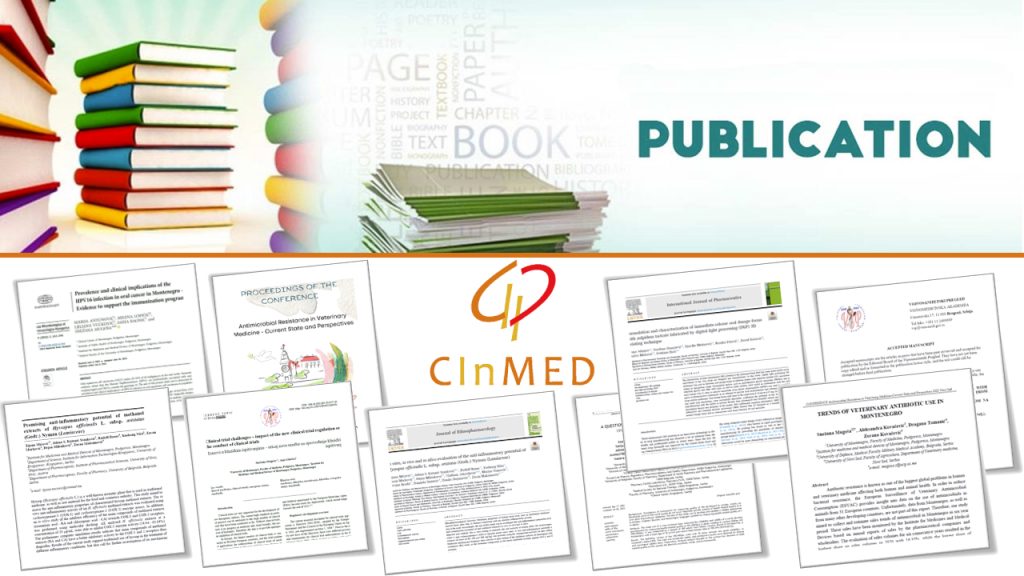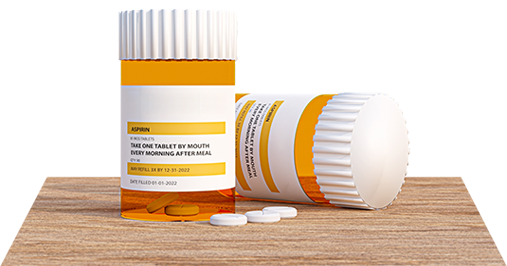Publications
Home » About CInMED » Publications

Institute for Medicines and Medical Devices of Montenegro actively works on the improvement of the information of expert and the general public about the importance of certain areas within its work scope. As an efficient and socially responsible institution and aware of the fact that providing adequate information will contribute to the public health protection, the Institute published a brochure providing information to expert and general public about competences, organization, human resources and most important activities of the Institute.
Antimicrobial resistance is the resistance of microorganisms to antimicrobial medicines, while the resistance of bacteria to the action of antibiotics is called antibiotic resistance. Excessive, improper and unnecessary use of antibiotics in animals and humans favors the growth of antibiotic resistance which gives rise to antibiotics not showing their effect when it is really necessary. Antibiotic resistance is a global problem and a great danger to human health which may only be fought against with rational and proper use of antibiotics.
Rational and responsible use of antibiotics in animals and humans can reduce the risk of bacteria becoming resistant to antibiotics (antibiotic resistance). This is particularly important for antibiotics used to treat both humans and animals, as well as for antibiotics that are used as the last line of treatment for critical infections in humans.
European Medicines Agency (EMA) classified antibiotics taking into account the need for antibiotic use in animals in relation to the risk of antibiotic resistance to public health.
Categorization can help veterinary professionals decide which antibiotic to use and provide other information to be considered when choosing an antibiotic.
Rational and responsible use of antibiotics in animals and humans can reduce the risk of bacteria becoming resistant to antibiotics (antibiotic resistance). This is particularly important for antibiotics used to treat both humans and animals, as well as for antibiotics that are used as the last line of treatment for critical infections in humans.
Falsified medicine is a medicine that is fraudulently presented in terms of identity and/or origin, and may contain right, or wrong ingredients, be without active substances, or contain wrong amounts of active substances and be in wrong, or falsified packaging. Falsified medicines are the result of organized crime through which they are placed on the market solely for the purpose of making a profit.
What is an adverse reaction to a medicine? Any adverse and unintended effect of a medicine, or vaccine. All medicines can cause adverse reactions, although they do not occur in everyone. In terms of severity, adverse reactions range from mild discomforts, such as skin rashes, to serious, life-threatening reactions, such as heart attack, or liver damage. They can appear already a few minutes after taking the medicine, but also it may take years for them to manifest.
Non-prescription medicines are medicines that have been proven to be safe, effective and suitable for use without a doctor’s supervision, so patients can buy them at the pharmacy without a prescription. They are intended for the treatment of symptoms that patients can easily recognize themselves, i.e. for conditions that do not require a prior visit, or supervision by a doctor. Medicines that are dispensed without a prescription are often called OTC medicines (Over the Counter).
Regulation of clinical trials consists of a number of laws and secondary legislation and ethical standards. This manual is an opportunity to bring the aforementioned regulations, methods of conducting clinical trials and their role in the medicine development closer to all participants and potential participants in clinical trials in a simple, concise and informative manner.
This manual gives answers to following questions:
- What is a clinical trial and what is it important for?
- What is the manner of conducting clinical trials?
- What are the limitations for conducting clinical trials?
- Who can participate in clinical trial as a subject, or as a researcher?
- What are the subjects’ rights and how are they protected?
- What to consider before participating in a clinical trial?
- What is the role of the Institute for medicines and medical devices in clinical trials?
- What are the basic principles of Good Clinical Practice?
Brochure “Safe use of medicines” is a guide for healthcare professionals involved in a very important process of continuous monitoring of safety and efficacy of medicines. Fundamental principles of pharmacovigilance related to activities of detection, assessment, understanding, prevention and response to adverse reactions to medicines, as well as other issues related to their use are presented through numerous chapters.
Maximum involvement of all participants in the pharmacovigilance system is a prerequisite for effective monitoring of safe use of medicines in Montenegro. Healthcare professionals and persons responsible for pharmacovigilance in pharmaceutical companies have a legal obligation to report any suspected adverse reaction to a medicine to the Institute without delay. Through cooperation and exchange of information with all institutions in the healthcare system, education of expert and general public about pharmacovigilance, the Institute makes its full contribution to public health protection.
Creating an efficient national system of supervision over safe use of medicines implies the involvement of pharmacists in the process of adverse reactions to medicines reporting. Pharmacists, as medicines experts, the last control for a prescriber, i.e. healthcare professionals who are the most important link between a patient and a prescriber, have the opportunity to monitor safety of therapy by reporting adverse reactions, as well as to participate in the development of pharmacovigilance, as a scientific discipline based on evidence. Pharmacist’s key role is in monitoring safety of over-the-counter (OTC) medicines, since a pharmacist is the most important source of information for this category of medicines for their effective and safe use.
Healthcare professionals in Montenegro have a professional, moral, but also legal obligation to report any suspected adverse reaction to a medicine. A particularly important role in the pharmacovigilance system have doctors as they mostly encounter with adverse reactions to medicines during daily clinical practice. Doctors have direct contact with patients and have the opportunity to monitor safety of the therapy by reporting adverse reactions.
Nurses and technicians are the cornerstone of any healthcare system. They are directly involved in the preparation and administration of certain medicines and are in the best position to notice an adverse reaction/deviation from the quality standard of a medicine. Continuous education of nurses and technicians in the field of pharmacovigilance is one of the prerequisites for rational pharmacotherapy.
Development of a health system and quality of health service are measured, among other things, by the number and quality adverse reactions to medicines reports, which healthcare professionals send to competent medicines authorities. In addition to regular manner of sending reports to CInMED (in person, by post, fax and email), doctors in health centers and general hospitals have the option of sending adverse reactions to medicines reports to CInMED directly through the health care information system.
In the flyer prepared for the improvement of the existing form for adverse reactions to medicines reporting through the information system, precise instructions were given to doctors in a clear and simple manner on how to complete the report correctly, with an emphasis on mandatory fields that must completed in order for the report to be valid. It is expected that using this new, significantly improved method of adverse reactions reporting, will result in a significant increase of the number of reports, as that is one of key indicators of the effectiveness of national pharmacovigilance system.
Consumption monitoring of medicines on the market shows the health status of the population. Additionally, it significantly contributes to the assessment of pharmacotherapeutic attitudes and prescribing habits in practice and enables identifying the factors that influence excessive, or insufficient use of certain medicines.
Institute for Medicines and Medical Devices published brochures providing information on the consumption of medicines in Montenegro which were processed using the World Health Organization methodology.
Brochures show overviews of data on medicines consumption in Montenegro in different pharmacotherapeutic groups, as well as a comparison with data on medicines consumption from neighboring countries (Serbia and Croatia), which have been collecting and processing data on consumption since 2005.
Consumption of medicines (Published in 2012)
Consumption of medicines (Published in 2013)
Consumption of medicines (Published in 2015)
Consumption of medicines (Published in 2016)
In 2018 a comparative analysis of the consumption of medicines in Montenegro 2013 – 2017 was published using the data on medicines consumption.
Also, in 2022, the Institute for Medicines and Medical Devices published an analysis of medicine consumption for the past five years “Consumption of medicines in Montenegro 2017 – 2021.”
Proposals for the Summary of product characteristics (SmPC) and Package leaflet (PL) are documents prepared by a medicine manufacturer and submitted to the Institute for Medicines and Medical Devices as a mandatory part of the documentation required to obtain a marketing authorisation. These proposals, along with other attached documentation on quality, safety and efficacy of a medicine, are assessed and approved by the Institute’s experts within the marketing authorisation issuance procedure. Approved SmPC and PL are an inseparable and integral part of the issued marketing authorisation. Any advertising of medicines to expert, or general public must comply with the information provided in the latest approved version of SmPC and PL.
In order to inform expert and general public, the Institute for Medicines and Medical Devices published a brochure containing basic information about what SmPC and PL are, what information can be found in these documents, how they are created and how they can be accessed.
Generic medicines are medicines that contain the same active substance, in the same strength and pharmaceutical form as medicines in relation to which they were developed (original medicines) and which have been proven to be essentially similar to original medicines, with a comparable benefit/risk ratio in recommended use of a medicine. Therapeutic safety and efficacy of generic medicines are equivalent to the one of original medicines, which is proven by bioequivalence studies that must meet strict requirements. The importance of generic medicines is that they are more affordable compared to original ones, given that they do not require initial basic and clinical research.
Search register
Here you can search for medicines in our register


Sign up for
Newsletter








